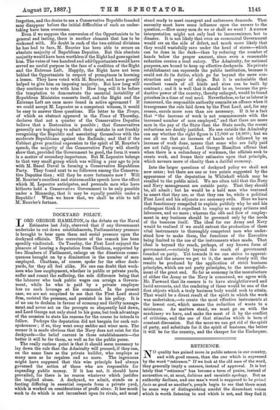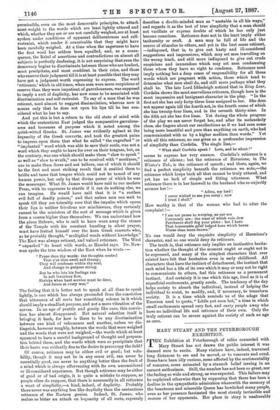RETICENCE.
NO quality has gained more in public esteem in our country, and with good reason, than the one which is expressed by the word "reticence." If we look at the old uses of the word, they generally imply a censure, instead of approval. It is but lately that "reticence" has become a term of praise, instead of accusation or, at most, dubious and casuistic apology. But as authority declines, and one man's word is supposed to be prime/ facie as good as another's, people begin to see that there must be some way of distinguishing amidst the discordant voices which is worth listening to and which is not, and they find it permissible, even on the most democratic principles, to attach most weight to the words which are least lightly uttered and which, whether they are or are not carefully weighed, are at least spoken under conditions of apparent deliberateness and self- restraint, which render it conceivable that they might have been carefully weighed. At a time when the eagerness to have the first word has seldom been equalled, and, as a conse- quence, the Babel of assertions and contradictions on almost all subjects is perfectly deafening, it is not surprising that even the democracy begins to discriminate between those who are loudest, most precipitate, and most confident in their cries, and those who reserve their judgment till it is at least possible that they may have got a judgment worth expressing to express. The word 'reticence,' which in old times, when men were more suspicious of reserve than they were impatient of garrulousness, was supposed to imply a sort of duplicity, has now come to be associated with discrimination and self-restraint. To say of a man that he was reticent, need almost to suggest dissimulation, whereas now it means only that he does not open his lips till he has con- sidered what he has to say.
And yet this is but a return to the old state of mind with which the sententious East judged the comparative garrulous- ness and looseness of purpose which it noted among the quick-witted Greeks. St. James was evidently aghast at the loquacity of the Greek converts, and took the greatest pains to impress upon them that what he called "the engrafted" or "implanted " word which was able to save their souls, was not a word which they ought to have for ever on their tongues, but, on the contrary, was one which should make them "slow to speak" as well as "slow to wrath," one to be received with "meekness," one to make them doers and not talkers, one of which it should be the first and most striking result that it enabled them to bridle and tame that tongue which could not be tamed of any human power, but only by that divine power of which he was the messenger. What St. James would have said to our modern Press, with its eagerness to startle if it can do nothing else, we can imagine. He would have said that it is "a restless evil full of deadly poison," and that unless men can wait to speak till they are tolerably sure that the impulse which opens their lips is neither frivolous nor mischievous, they certainly cannot be the ministers of the sort of message which is given from a source higher than themselves. We can understand how the pious Hebrew, who is said to have worn away the stones of the Temple with his constant kneeling in silent prayer, must have fretted himself over the keen Greek converts who, as he probably thought, "multiplied words without knowledge." The East was al ways reticent, and valued reticence. The West " unpacked" its heart with words, as Hamlet says. Dr. New- man spoke the true wisdom of the East when he wrote :- " Prune thou thy words: the thoughts control
That o'er thee swell and throng; They will condense within thy soul, And change to purpose strong.
Bat be who lets his feelings ran In soft luxurious flow, Shrinks when bard service must be done, And faints at every woe."
The feeling that it is better not to speak at all than to speak lightly, is one which has always proceeded from the conviction that utterance of all sorts has something solemn in it which should imply a steadfast purpose, and not a mere vibration of the nerves. In an age of prattle and gossip like ours, this convic- tion has almost disappeared. But natural selection itself is bringing it back, for how is there to be any discrimination between one kind of vehemence and another, unless we dis- tinguish, however roughly, between the words that were weighed and the words that were not weighed,—the words which at least appeared to have a careful background of thought and prepara- tion behind them, and the words which were so precipitate that their haste was evidently due to the desire to preoccupy the field?
Of course, reticence may be either evil or good; but volu- bility, though it may not be in any sense evil, can never be essentially good, can never be anything better than the fruit of a mind which is always effervescing with its own unconsidered or ill-considered experience. But though reticence may be either of good or of bad origin, it is quite a mistake to suppose, as people often do suppose, that there is necessarily in all reticence a want of simplicity,—a kind, indeed, of duplicity. Probably there never was anything less like duplicity than the sententious reticence of the Eastern genius. Indeed, St. James, who makes so bitter an attack on loquacity of all sorts, expressly describes a double-minded man as " unstable in all his ways," and regards it as the test of true simplicity that a man should not vacillate or express doubts of which he has only just become conscious. Reticence does not in the least imply either taciturnity or craft. A man may be full of life and the source of stimulus to others, and yet in the best sense reticent, —indisposed, that is, to give out hasty and ill-considered suggestions and impressions, which may set men travelling on the wrong track, and still more indisposed to give out crude suspicions and innuendoes which may set men condemning those whom they have no right to condemn. Reticence need imply nothing but a deep sense of responsibility for all those words which are pregnant with action, those which tend to determine what men shall do, and still more perhaps what they shall be. The late Lord Iddesleigh noticed that in King Lear, Cordelia shows the most marvellous reticence, though hers is the moat impressive and benignant character in the play. "In the first act she has only forty-three lines assigned to her. She does not appear again till the fourth act, in the fourth scene of which she has twenty-four lines, and in the seventh thirty-nine. In the fifth act she has five lines. Yet during the whole progress of the play we can never forget her, and after its melancholy close, she lingers about our recollections as if we had seen some being more beautiful and pure than anything on earth, who had communicated with us by a higher medium than words." Yet with all this reticence, no one gives us a profounder impression of simplicity than Cordelia. The single line,— "What shall Cordelia speak P Love, and be silent !"
seems to express her very essence. Cordelia's reticence is a reticence of silence ; but the reticence of Hermione, in The Winter's Tale, is the reticence of speech ; and there, again, we find a perfect simplicity beneath the reticence we note,—the reticence which keeps back all that cannot be truly uttered, and yet has no lack of simple and fitting utterance. What reticence there is in her farewell to the husband who so unjustly accuses her !—
" Adieu, my lord !
I never wished to see you sorry ; now I tract I shall."
How worthy is that of the woman who had to titter the complaint
!- "I am not prone to weeping, as our sex Commonly are : the want of which vain dew Perchance shall dry your pities : but I have That honourable grief lodged here which burns Worse than tears drown."
No one would deny the exquisite simplicity of Hermione's character, and no one would deny its reticence. - The truth is, that reticence only implies an instinctive hesita- tion whether the thought of the moment ought or ought not to be expressed, and many of the simplest characters that ever existed have felt that hesitation even in early childhood. All characters that have the instinct of detachment, the instinct that each mind has a life of its own which it may or may not be right to communicate to others, feel this reticence as a permanent instinct. And certainly it is one which this age, fond as it is of superficial excitements, greatly needs. The tendency of the day helps society to absorb the individual, instead of helping the individual to resist, to modify, and, if necessary, to transform society. It is a time which reminds us of the adage that Emerson used to quote, " Little pot soon hot," a time in which small excitements spread very fast, and carry people away who have no individual life and reticence of their own. Only the truly reticent can be secure against the society of such an age
as oars.



































 Previous page
Previous page